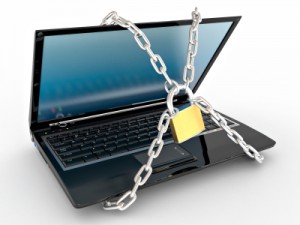 Your business is already aware of the importance of IT security, used to keep data from loss or theft. For instance, your company network will use a firewall and antivirus software to prevent hackers or malware accessing internal resources.
Your business is already aware of the importance of IT security, used to keep data from loss or theft. For instance, your company network will use a firewall and antivirus software to prevent hackers or malware accessing internal resources.
But as more businesses introduce more flexible working practices, especially mobile computing, they also need to re-evaluate security provisions.
Stolen laptops are a backdoor into your company network
The humble laptop is an essential tool for almost every employee who ever needs to work outside the office. From those who work in a home office, to the classic “road warrior”, laptops ensure that anyone working outside head office can access email and other business applications: they remain fully productive whenever, and wherever they physically happen to be.
However, every device outside your network represents a potential security problem. For example, each device will have a VPN configured to enable access to company resources – effectively an authorised backdoor which anyone with access to the machine can use. So if someone steals a laptop, it is similar to giving the thief a key to your office.
Fortunately it is relatively easy to disable access for a specific device or user account as soon as you become aware of a theft. But that is only half the story.
Laptops are worth more than their hardware resale value
A stolen laptop has a concrete value in that it can be easily sold on for a few hundred pounds. And in many cases that is as bad as it gets – your business loses the machine and must claim on insurance to buy a replacement.
But there is a second, greater value attached to each laptop your employees use – that of the data stored on it. Passwords, accounts details, personal data and sensitive intellectual property can all be sold on the dark web, often for much more than the laptop itself is worth. Loss of data could be more damaging to your business than the asset itself, especially as you have a responsibility under the Data Protection Act to prevent such exposure.
Protecting against data theft with drive encryption
The best way to protect against data being stolen and sold is to ensure that all company laptops have drive encryption enabled. This technology encrypts data stored on the laptop hard drive, rendering it unreadable to anyone but an authorised user. If someone steals an encrypted laptop and attempts to extract the data stored on it, they will be unable to read or access any of the files.
Drive encryption is perfectly seamless to authenticated users. They log on to the machine as normal, and files decrypt as they are opened. As the user logs off, the files are re-encrypted, rendering them inaccessible again.
Drive encryption is a proactive security measure, pre-emptively protecting data in the event that a laptop is lost or stolen.
For more help and advice on drive encryption, or any other aspect of remote IT security, please give the Broadband Cloud Solutions team a call and we will be happy to help.
Leave a Reply